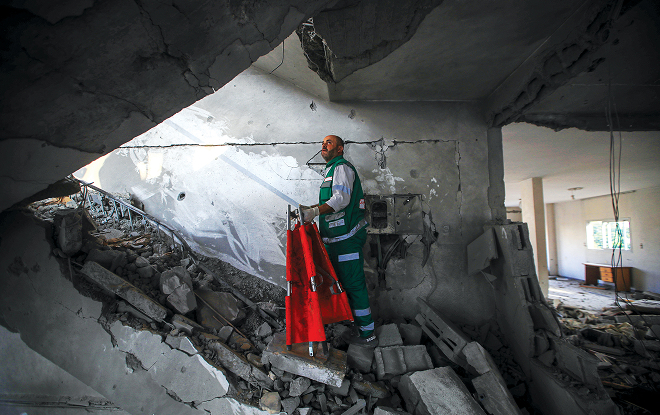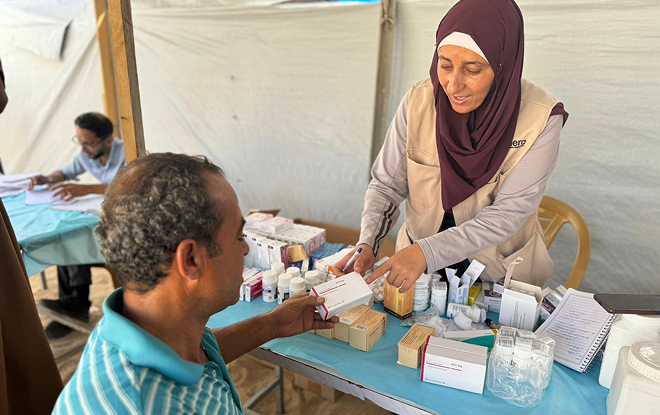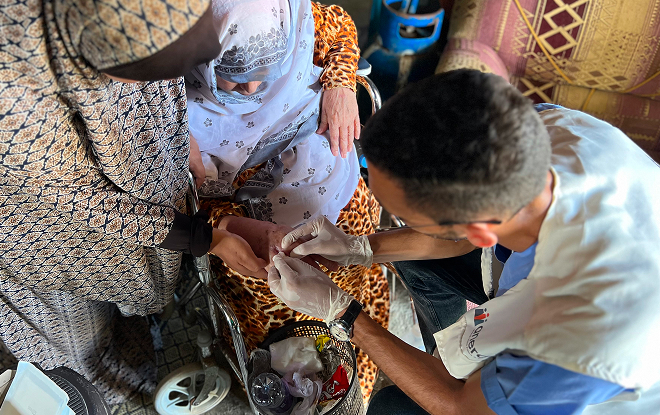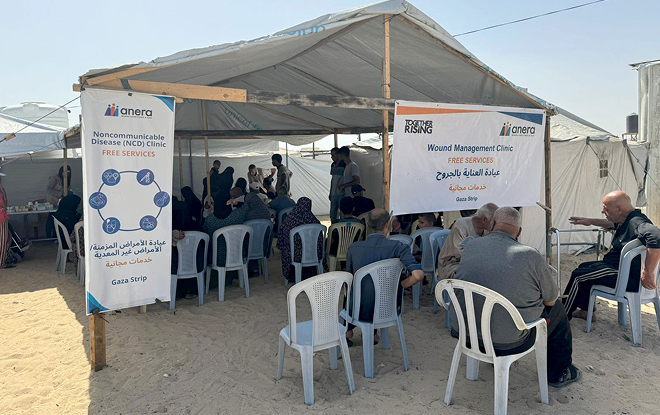Gaza is officially experiencing a famine. Meanwhile, supplies that could save lives are piled up, blocked from where they are critically needed.

Photo credit: Mohamad Zaanoun
Last week, the Integrated Food Security Phase Classification (IPC) confirmed that the official conditions have been met to declare a famine in and around Gaza city. Over half-a-million people now face catastrophic hunger. This means widespread starvation, malnutrition, and hunger-related deaths. The United Nations’ World Food Programme says every child in Gaza under the age of five is at risk of life-threatening malnutrition.
‘Famine’ is the most extreme phase of the United Nations system that monitors food insecurity. The system was first set up in 2004, and since then the term has only been officially used in four circumstances. It is the worst-case scenario.
This famine is a man-made crisis.
It is the direct result of the aid blockade around Gaza. For months, food, water, medical aid and other crucial supplies have been piling up in warehouses, with only a fraction being allowed through, and nowhere near enough to meet the critical needs of men, women, and children inside the city.

Medical consultation in Gaza, Photo credit: Anera - IHP
Our partner, International Health Partners (IHP) has two shipments of life-saving medical and malnutrition supplies still awaiting access from Israel to cross the border for distribution. They have several other shipments in the pipeline waiting to be sent.
Meanwhile, the military-controlled aid distribution model, Gaza Humanitarian Foundation, is failing to deliver adequate food supplies, and forcing those who collect it to take serious risks. The United Nations reports more than 1,000 people have died trying to pick up aid.
Allowing humanitarian aid to reach civilians is a legal obligation under international humanitarian law. In times of armed conflict, all parties must ensure civilians have access to the basic necessities of food, water, and medical care.
International law (like Article 54 of the Geneva Convention) also prohibits the use of starvation against civilians as a tactic of war. This means it is unacceptable to block food, water, or other essential supplies to force or punish people during conflicts.
"In 2025, starvation is an unacceptable method of warfare,” says Tearfund’s CEO, Ian McInnes. “Yet, I have zero doubt as a humanitarian, that this is taking place in Gaza today. The Government of Israel are trying to stop supplies falling into the hands of what remains of Hamas, but to starve the civilian population of Gaza, two million people, to do that, that would be a war crime."
Humanitarian aid assistance must be allowed into Gaza immediately, freely and at scale.
We do not get to push aside these universal truths because it’s inconvenient or challenging in these current times. They matter just as much today as they have before.
How has Tearfund responded to the conflict in Israel and Gaza?
The generosity of our supporters - offered in a time of great political complexity and need - has been helping men, women and children get crucial medical care in Gaza, West Bank and Lebanon.

Elderly lady receiving medical care in Gaza, Photo credit: Anera - IHP
We’ve been able to support the only functioning hospital in the north of Gaza, as it provides urgent medical care. Keeping a hospital running amid this crisis is a testament to their resilience. There have been multiple attacks on their compound since the war began, yet, remarkably, they are still providing relief and surgeries to those who need it. Their updates remain a vital window into the realities being faced by civilians on the ground.
We’ve also been able to work with Tearfund Lebanon, helping youth affected by the conflict to heal. The team operates a mobile outreach unit that’s trained in helping young people address their psychological, emotional, social and physical needs. They’ve been able to provide over 10,000 counselling sessions and supported over 13,000 young people to receive medical treatments.

Anera-Gaza Wound and NCD clinic Photo credit: Anera - IHP
And thanks to the ongoing generosity of our supporters, International Health Partners have successfully delivered 14 shipments of medical supplies into Gaza over the last two years, enough to support 25,000 people. They are continuing to do what they can to distribute supplies under extremely challenging circumstances, in both Gaza and West Bank.
We are ready to do more. But until full and sustained humanitarian access is allowed, our ability to respond on the ground remains severely restricted. Your donations mean that supplies are ready to go the moment they are released, and our partner can move quickly to deliver them. We continue to stand with our brothers and sisters in the humanitarian sector, calling for:
+ The Government of Israel to open all land crossings and ensure safe, neutral, and sustained humanitarian access to all of Gaza.
+ An immediate and sustained ceasefire
+ The release of all hostages
Join with us in prayer for the Middle East, click here to read our prayer guide
If you would like to donate towards our partner's work on the ground
Donate Now